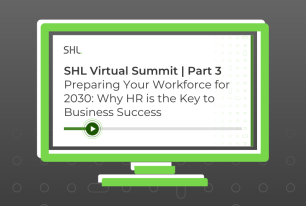Predicting Graduate Success—How the U.S. Stacks Up Against Global Counterparts
Graduate Hiring is a huge challenge facing many organizations. How can you hire the right talent for jobs that may not exist in 5 years’ time, or for jobs that do not even exist yet? The key is to understand the underlying skills that predict job performance and potential.
Share
New Grads, New Challenges for Organizations
With the slowing U.S. job market and talent shortages, the power of a skills-based approach to hiring has become more commonplace. Combined with the revolutionary impact of AI and the fact that around 60% of jobs in advanced economies may be impacted by AI¹, it can be a hard to know what to look for when searching for the right talent to take your business forward.
To make accurate hiring choices and set grads up for success, it is key to know their strengths and where they need to grow. This way, you can offer the right learning opportunities and ensure your business is ready for whatever the future brings.
U.S. Graduates Outperform Global Counterparts in These 4 Skills
SHL analyzed a diverse dataset of 200,000 grads in different industries and geographic regions using objective assessment data on 96 skills. Using this approach, we were able to explore the relationship between specific skills and overall job performance, ultimately identifying key skills that predict a graduate’s ability to succeed in different roles, globally. So how do US grads stack-up against their global counterparts?
An analysis of 8,000 grads from 2022/3 and 2023/4 cohorts shows that US grads are particularly strong in four key skills compared to peers elsewhere in the world. The skills that really stand out are ability to cope with setbacks and criticism, taking responsibility, working to high quality standards, and striving to achieve.
The three skills that U.S. grads didn’t score as highly as their global counterparts are analyzing information, generating new ideas, and using time efficiently, all of which are developable at work.
Where U.S. Grads Outperform Global Peers
- Copes with setbacks and criticism
- Strives to achieve
- Takes responsibility
- Works to high quality standards
Where Global Peers Outperform U.S. Grads
- Analyzes information
- Generates new ideas
- Uses time efficiently
Precision Matters When It Comes to Data-Driven Decisions
Although this research provides a good insight into skills that predict success, every business is different, and every organization will have its own skills that are more or less important depending on context and what strategic initiatives are taking priority at any given time. For example, major employer General Mills has noted that it needs “individuals that have that adaptability and resilience,” whereas a company in the tech industry might place greater importance on learning quickly or maintains good working relationships.
Skills-based hiring is not a new concept or approach. In fact, skills data is everywhere. You can read a person’s LinkedIn profile, resume, or interview them, and skills will be well represented. But not all data is created equal; data can be subjective, unreliable and unvalidated, so it is important to understand how data is collected and measured.
The right talent data about individuals’ areas of strengths and development, together with actionable insights, can guide organizations in closing developmental gaps and mobilizing talent based on their strengths. Decisions around hiring, skills development, and succession planning can be made with confidence and more likely to lead to future success.
In a world of AI, the role of assessments is not to be underestimated. Assessments continue to be one of the most accurate and reliable ways to measure people’s skills. The data from those assessments can be used to make fair and legally defensible decisions about who to hire, how to develop, and when to mobilize grads to help them grow in the organization.
Learn how SHL can help you find the right Early Careers Talent to drive future success.
References:
¹https://www.imf.org/en/Blogs/Articles/2024/01/14/ai-will-transform-the-global-economy-lets-make-sure-it-benefits-humanity










